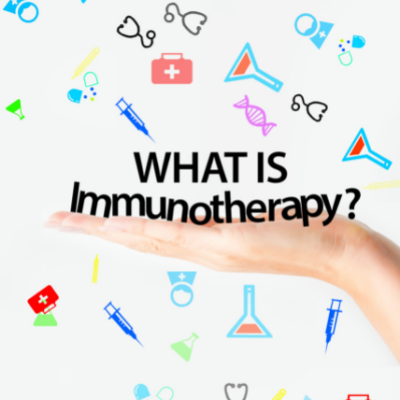Immunotherapy, also referred to as immuno-oncology, is a type of medical treatment that harnesses the body’s immune system. Your immune system is an interactive network of organs, cells, and other factors that protect you from foreign pathogens (bacteria, viruses, and other microorganisms). It also contains its own checks and balances system to resolve an immune response and protect immune cells from attacking normal tissue. Cancer cells are tricky because they are derived from normal cells. When they become cancerous, new factors arise that identify a cancer cell from a normal cell. In some cases, these irregularities can be identified by the immune system as foreign, causing the immune system to attack the cancerous tissue. The goal of immunotherapy is to take advantage of the body’s naturally occurring clearance of foreign material (i.e., bacteria, viruses, or cancerous cells) via the immune system.
Treatment Options 
- Immune Checkpoint Blockade (FDA approved for lung cancer)
- Cancer Vaccine (no FDA approved therapy for lung cancer)
- Adoptive T cell Transfer (no FDA approved therapy for lung cancer)
Immune Checkpoint Blockade
The immune system uses checkpoint molecules as a way to control immune response. Cancer cells often express these checkpoint molecules, which act as a brake to the immune cells, dampening the immune response. Immune checkpoint blockade therapy removes this brake from immune cells, so they can attack the cancer cell. Approved immune checkpoint inhibitors for lung cancer include PD-1 inhibitors, PD-L1 inhibitors, and CTLA-4 monoclonal blocking antibodies. Checkpoint inhibitors are given via intravenous (IV) infusion. Although they have similar side effects as chemotherapy (nausea, fatigue, itching, skin rash), they are generally less toxic. They work by stimulating the immune system, which can cause other immune-associated side effects (inflammation, fatigue, fever, itching, nausea, skin rash).
Cancer Vaccine
Cancer vaccines work by inducing an immune response against a specific target protein expressed only by cancer cells or at extremely low levels by normal cells and high levels by cancer cells. By targeting cancer cells this way, an immune response is elicited through the conditioning of immune cells. Currently, no FDA-approved vaccine is available for lung cancer treatment.
Adoptive T cell Transfer
T cells are a type of white blood cell and are immune cells that mediate many immune responses. In adoptive T cell transfer therapy, T cells are removed from your body and conditioned in a laboratory for optimized response to specific cancer cells. This conditioning allows for the T cells to induce a robust immune response against a targeted cancer protein or cancer cell population. Currently, no FDA-approved adoptive T cell transfer therapy is available for lung cancer treatment.
Eligibility
FDA-approved immunotherapy lung cancer treatments are available for patients at different stages of diagnosis. Specific mutations, biomarkers, and types of lung cancer can indicate which therapy has the potential to be most beneficial. Previous treatments, as well as general health, may also affect immunotherapy options.
Many patients receive immunotherapy as an initial cancer treatment. It can also be given in combination with chemotherapy or in combination with another type of immunotherapy. Additionally, immunotherapy options are available for patients with advanced-stage lung cancer. Schedule an appointment for more information and to understand your options.

